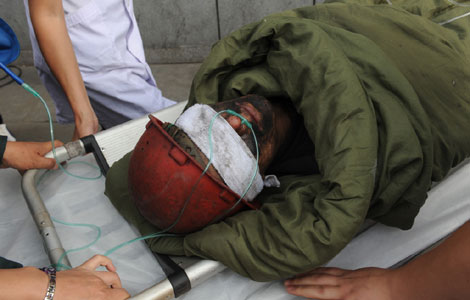Interpretation stiffens penalties for hackers
Updated: 2011-08-30 07:29
By Cao Yin and Zhao Yinan (China Daily)
|
|||||||||||
BEIJING - Starting on Thursday, hackers who broke into 20 or more computers will face jail terms of up to seven years, according to a new judicial interpretation issued jointly by the China's Supreme People's Court and Supreme People's Procuratorate.
People who hack from 20 to 100 computers, or steal from 10 to 50 user names and passwords for online-payment or stock accounts, will get at least three years in prison. And those who hack even more computers or steal more passwords will face jail terms of up to seven years.
The latest rule, an interpretation made to deal with online crimes, which were added to the Criminal Law in 2009, also applies to Chinese hackers who steal information from foreign computers, said Zhou Guangquan, a member of the National People's Congress's law committee and a professor in criminal law at Tsinghua University.
An official with the Supreme People's Court's research department, who declined to provide his name, said the judicial interpretation was issued to set specific penalties for online crimes. It was also an attempt to combat computer viruses and the increasing number of hacking cases seen recently.
By the end of June, China was home to more than 485 million netizens, according to the China Internet Network Information Center's latest Report on Internet Development in China.
In 2010, more than one million domestic Internet-protocol addresses - individual numbers assigned to devices that are connected to the Internet - were controlled by overseas hackers, according to a report published by the State Council's Information Office last year.
The Ministry of Public Security said the number of computer viruses seen in China has increased by 80 percent this past year, and eight out of 10 computers that are connected to the Internet have been hacked during the past five years.
Tang Hongxin, a Beijing-based lawyer specializing in criminal regulations at Yingke Law Firm, told China Daily on Monday that he welcomed the interpretation because it "brings more practical conveniences for lawyers and judges".
"It will be very helpful for me to be able to plead for the accused in accordance with the new and specific interpretation," he said. "Meanwhile, judges and prosecuting authorities can also hand down sentences in accordance with it."
"Hackers who invade businesses' websites and computer systems, especially officials', deserve criminal punishments because they threaten to undermine the security of society."
The interpretation will be an effective way to prevent people from hacking computers, he added.
Other experts think differently. Liu Qing, an official who deals with network security for a Shanghai-based information technology company, did not think the interpretation will do much to impede hackers.
"I have helped companies, especially middle-sized and small ones, maintain their websites' security. But we couldn't stop the hackers," he said.
"There are huge business interests behind those computer invasions, which is also the reason why (the hackers) can survive these crackdowns," he added.
Hot Topics
Anti-Gay, Giant Panda, Subway, High Speed Train, Coal Mine, High Temperature, Rainstorm, Sino-US, Oil Spill, Zhu Min
Editor's Picks

|

|

|

|

|

|






